Zygote: Understanding the Beginning of Life
A zygote is the initial cell that forms when two gametes, or reproductive cells (sperm and egg), combine during fertilization. This marks the beginning of the development of a new organism. The zygote contains a complete set of chromosomes, half from the mother and half from the father, and has the potential to develop into a full organism through a series of cell divisions and differentiation.
Key Points about Zygote:
- The zygote is formed during fertilization when the sperm and egg fuse.
- It contains a complete set of chromosomes, half from the mother and half from the father.
- The zygote has the potential to develop into a new organism through cell division and differentiation.
- It marks the beginning of the embryonic development process.
Study Guide:
Here are some key concepts and questions to help you understand the topic of zygote:
Concepts:
- Reproductive cells: Understand the role of sperm and egg in the formation of a zygote.
- Chromosomes: Learn about the genetic material contained in the zygote and its significance.
- Embryonic development: Explore the stages of development that follow the formation of the zygote.
Questions:
- What is a zygote and how is it formed?
- What is the role of chromosomes in a zygote?
- How does the zygote develop into a full organism?
By understanding the formation and significance of the zygote, you will gain insight into the early stages of life and the process of embryonic development.
.◂Science Worksheets and Study Guides Eighth Grade. Earthquakes
Worksheet/Answer key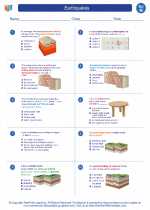 Earthquakes
Earthquakes  Worksheet/Answer key
Worksheet/Answer key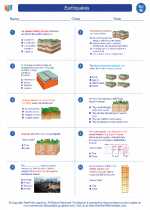 Earthquakes
Earthquakes  Worksheet/Answer key
Worksheet/Answer key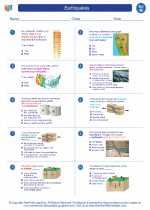 Earthquakes
Earthquakes  Vocabulary/Answer key
Vocabulary/Answer key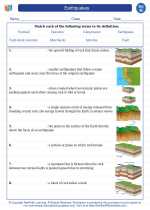 Earthquakes
Earthquakes  Vocabulary/Answer key
Vocabulary/Answer key Earthquakes
Earthquakes  Vocabulary/Answer key
Vocabulary/Answer key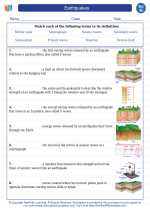 Earthquakes
Earthquakes  Vocabulary/Answer key
Vocabulary/Answer key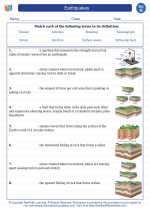 Earthquakes
Earthquakes 

 Worksheet/Answer key
Worksheet/Answer key
 Worksheet/Answer key
Worksheet/Answer key
 Vocabulary/Answer key
Vocabulary/Answer key
 Vocabulary/Answer key
Vocabulary/Answer key
 Vocabulary/Answer key
Vocabulary/Answer key
 Vocabulary/Answer key
Vocabulary/Answer key

The resources above cover the following skills:
Earth/Space Science: Students will use scientific skills and processes to explain the chemical and physical interactions (i.e., natural forces and cycles, transfer of energy) of the environment, Earth, and the universe that occur over time.
Earth History: Explain how sedimentary rock is formed periodically, embedding plant and animal remains and leaving a record of the sequence in which the plants and animals appeared and disappeared.
Explain how sedimentary rock buried deep enough may be reformed by pressure and heat and these reformed rock layers may be forced up again to become land surface and even mountains.
Explain why some fossils found in the top layers of sedimentary rock are older then those found beneath in lower layers: Folding; Breaking; Uplift; Faulting; Tilting.